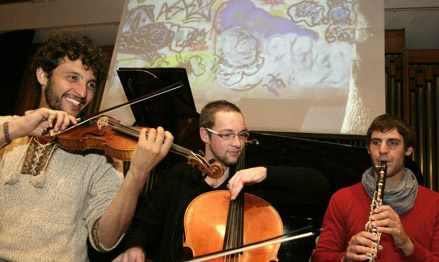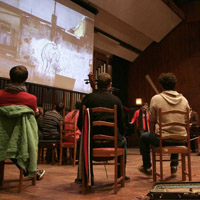Latest News Archive
Please select Category, Year, and then Month to display items
08 April 2021
|
Story Thabo Kessah
|
Photo UFS Photo Archive
 Dr KPD Maphalla with former UFS Chancellor, Dr Franklin Sonn, during the graduations in April 2007.
Dr KPD Maphalla with former UFS Chancellor, Dr Franklin Sonn, during the graduations in April 2007.
The University of the Free State is sad to learn of the passing of alumnus and award-winning Sesotho literary giant, Dr KPD Maphalla.
The literary works of Dr Khotso Pieter David Maphalla, like many other African writers and artists, were influenced and characterised by his own era of powerful forms of oppression and exclusion from dominant literary discourses. In his own right and through his writings of poetry, novels, short stories, and kodiamalla (dirge), he articulated a deliberate political and social protest and pushed for a place for African languages in literature at the height of apartheid.
“He entered the professional scene with his ground-breaking novel, Kabelwamanong, in 1982 at the age of 27. His career actually started in 1971 while he was still at school. Since his first novel, he has produced at least two books annually, covering the genres of poetry, novels, dramas, and short stories. As a dramatist, Dr Maphalla has written a number of excellent and educative radio dramas for the then Radio Sesotho (now Lesedi FM),” said his long-time friend and Head: African Languages at the University of the Free State, Dr Nyefolo Malete.
“It was for this writing prowess that he received recognition from the UFS when he was awarded an Honorary Doctorate in Literature by the Department of African Languages during a momentous ceremony on the Qwaqwa Campus in 2007,” added Dr Malete.
Dr Malete also revealed that, despite losing the use of his right hand after suffering a stroke following a car accident in the late 1990s, Dr Maphalla continued writing using his left hand. “He was adamant that, what he referred to as his ‘supposed disability’, would not deter his passion for writing.”
Dr Maphalla’s work has also produced numerous scholarly studies by the likes of Profs Moleleki Moleleki (protest poetry), Thapelo Selepe (lament and protest poetry), and Dr Seema Seema (process of cross-cultural communication). He was a committed Qwaqwa community member, who was also instrumental in the founding of Qwaqwa Community Radio (2000) and Metjodi Writers (2006), among others. He has written more than 70 books, many of which have been prescribed texts in schools.
Some of the awards he has won include:
South African Centre for Digital Language Resource (SADiLar) Sesotho Lexicographic Unit (Sesiu sa Sesotho) Lifetime Award for outstanding literary works and for promoting Sesotho literature (2019).
The Literature Festival and the University of the Free State Award for enormous contribution to Sesotho literature by a South African writer (2019).
Lifetime Achiever Award in Literature awarded by the Department of Arts and Culture (2005).
M-Net Book Prize for Sesotho poetry (2005). The first and thus far the only Sesotho author to have received this honour.
M-Net Book Prize for best novel (1996).
De Jager-HAUM Literary Award for his volume of short stories, Mohlomong Hosane (1993).
Thomas Mofolo Trophy for Best Novel, Best Poetry, and the Overall Award (1992).
Thomas Mofolo Trophy for Best Poetry (1991).
Dr JJ Moiloa Floating Trophy for Best Sesotho Poetry Book of the Year, Kgapa tsa ka (1985).
‘Celebrating the music of our times’
2013-07-25
|
 |
| 25 July 2013 |
The Odeion School of Music’s (OSM) New Music Week, hosted from 17–20 July 2013, offered an experience of profundity.
This was the second week-long festival of its kind to be hosted by the OSM – last year the 90th birthday of the South African composer, Stefans Grové, was celebrated with concerts and a symposium. This year the New Music Week focused on the visit of Ensemble Trans-Z under the artistic leadership of former OSM student, Alfred Vorster, a composer living in Zürich. The Order of the Odeion School of Music was bestowed upon Vorster during the festival. The members of the ensemble are the Belgian pianist Lukas Huisman, Danré Strydom (currently an OSM doctoral student in clarinet, based in Ghent), the Argentinian violinist Juan Braceras and the Swedish cellist Karolina Öhman (both currently living in Basel, Switzerland).
The week included three lectures. Lukas Huisman elucidated his doctoral project, Alfred Vorster offered an analytical perspective on the work of Helmut Lachenmann and Hannes Taljaard (Potchefstroom) delivered a commentary on his own composition practice. In addition to presenting masters’ classes in their individual instruments, Ensemble Trans-Z also hosted two workshops – one for the Mangaung String Project and another for OSM students and staff. These workshops focused on creative improvisation practices within an avant-garde style.
composition practice. In addition to presenting masters’ classes in their individual instruments, Ensemble Trans-Z also hosted two workshops – one for the Mangaung String Project and another for OSM students and staff. These workshops focused on creative improvisation practices within an avant-garde style.
The highlight of the festival was two gala concerts that were held on 19 and 20 July. The first concert was hosted by Ensemble Trans-Z themselves, with a selection of compositions in the avant-garde style. The programme included challenging listening material and was creatively presented with unconventional lighting techniques and visual material.
The concert on 20 July consisted of New Music of a more conventional nature. The Odeion String Quartet offered a varied presentation which consisted of a rich mix of talent. OSM postgraduate students Marianne Cilliers, Karol Legierski and Eljee du Plooy formed part of this spectacular performance. The OSM flute lecturer, Handri Loots and the members of Ensemble Trans-Z supplied additional depth to the concert. The experience was made extra special by the recently-formed New Music Ensemble of the School of Music at the North-West University – led by Augusto Arias. Under conductorship of Jan-Moritz Onken, the OSM Camerata completed this impressive collaboration.
The Camerata’s recital of Hendrik Hofmeyr’s Phantom Waltz, which the composer newly arranged especially for this ensemble, was but one of the artistic highlights of an inspiring presentation.